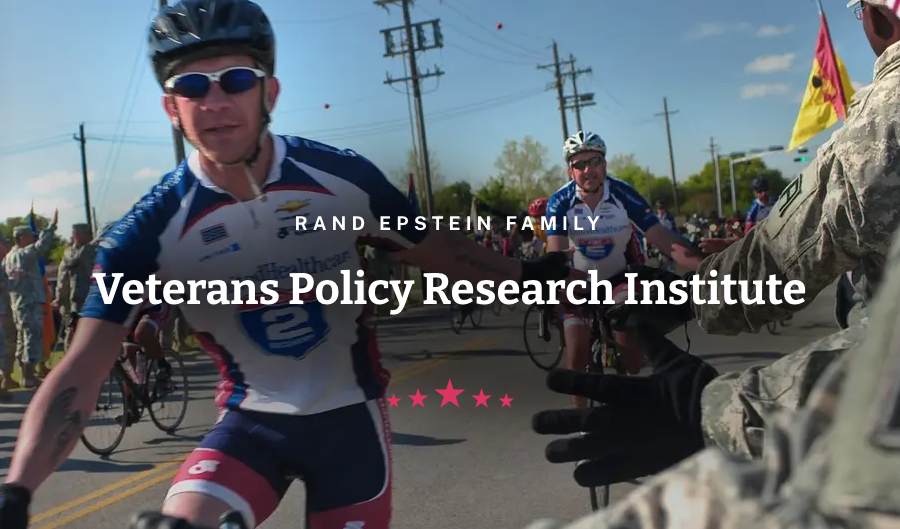
Publications of think tanks, peer-review institutions, and government that speak to the challenges faced by Veterans, caregivers, families, and survivors.
VA Volunteer Transportation Network: Rides, Donations, and Program Administration
“From 2018 through 2023, the annual number of rides provided through the program decreased by more than 50 percent, according to data from Disabled American Veterans. Similarly, VA data show that the total number of
program volunteers—primarily drivers—decreased by nearly 50 percent during this period.” Big challenges in administering the Volunteer Transportation Network program were recruiting and onboarding program volunteers.
How Working Conditions in Civilian Jobs Can Affect Veterans’ Health and Well-Being
“Too often, policy discussions focus on employment rates over the quality of the jobs that are available to veterans. Ensuring safe and healthy working conditions for veterans should be a priority of policies and programs to improve employment opportunities for this population. Veterans have already put their lives and health on the line for their country, sometimes with long-term effects that make them vulnerable to additional hazards on the job. Understanding why veterans choose the occupations they do and the risks they are exposed to could lead to policies that improve veteran health and support for all workers.”
Identifying Promising Prevention Strategies and Interventions to Support Justice-Involved Veterans
“An estimated 8 percent of the 2.2. million people incarcerated in jails and prisons in the United States are veterans, and an unknown number of veterans have had other types of contact with the criminal justice system. A better understanding of these justice-involved veterans can help military leaders, policymakers, and veteran-serving organizations identify promising interventions to prevent veterans from entering the criminal justice system and to support formerly incarcerated veterans as they reintegrate into their communities.”
Council on Criminal Justice Veterans Justice Commission: Duty to Dignity – Supporting Service Members in Their Transition to Civilian Life
“Roughly 245,000 service members transition from the military each year, and while most succeed, more than one in four veterans struggle with housing insecurity, health issues, financial difficulties, and other problems. Among post-9/11 veterans, a significantly higher proportion—44%—experience readjustment challenges, the Commission found. This new generation of veterans underwent historically high rates of multiple deployments and combat exposure, experiences linked to PTSD and traumatic brain injury. They are also more likely than non-veterans to end up in prison, distinguishing them from previous generations of veterans, who were less likely than their civilian counterparts to become incarcerated.”
“Given that many post-9/11 veterans lack VA services and did not receive much formal transitional support, it is not surprising that they are more likely than previous generations to report difficulties with their reentry to civilian life. They are also more likely than non-veterans to end up in prison. This sets them apart from previous generations of veterans, who were less likely than their civilian counterparts to become incarcerated. In response to these troubling findings, the Council on Criminal Justice Veterans Justice Commission has developed three recommendations designed to improve the transition from military to civilian life, ensure more service members transition successfully, and reduce the number of veterans who land in the criminal justice system.”
Government Accountability Office (GAO): Service Members Transitioning to Civilian Life – Agencies Can Improve Warm Handovers for Additional Assistance
Hundreds of thousands of service members transition from military service to civilian life each year, and some can be at risk for unemployment, homelessness, or gaps in medical care. To help them succeed, DOD provides certain service members with a warm handover to other agencies and organizations for additional assistance.
GAO is making eight recommendations, including that DOD develop plans to analyze warm handover data and assess the helpfulness of warm handovers, and that DOD, VA, and DOL coordinate to identify criteria for scaling piloted approaches. The three agencies agreed with the recommendations.
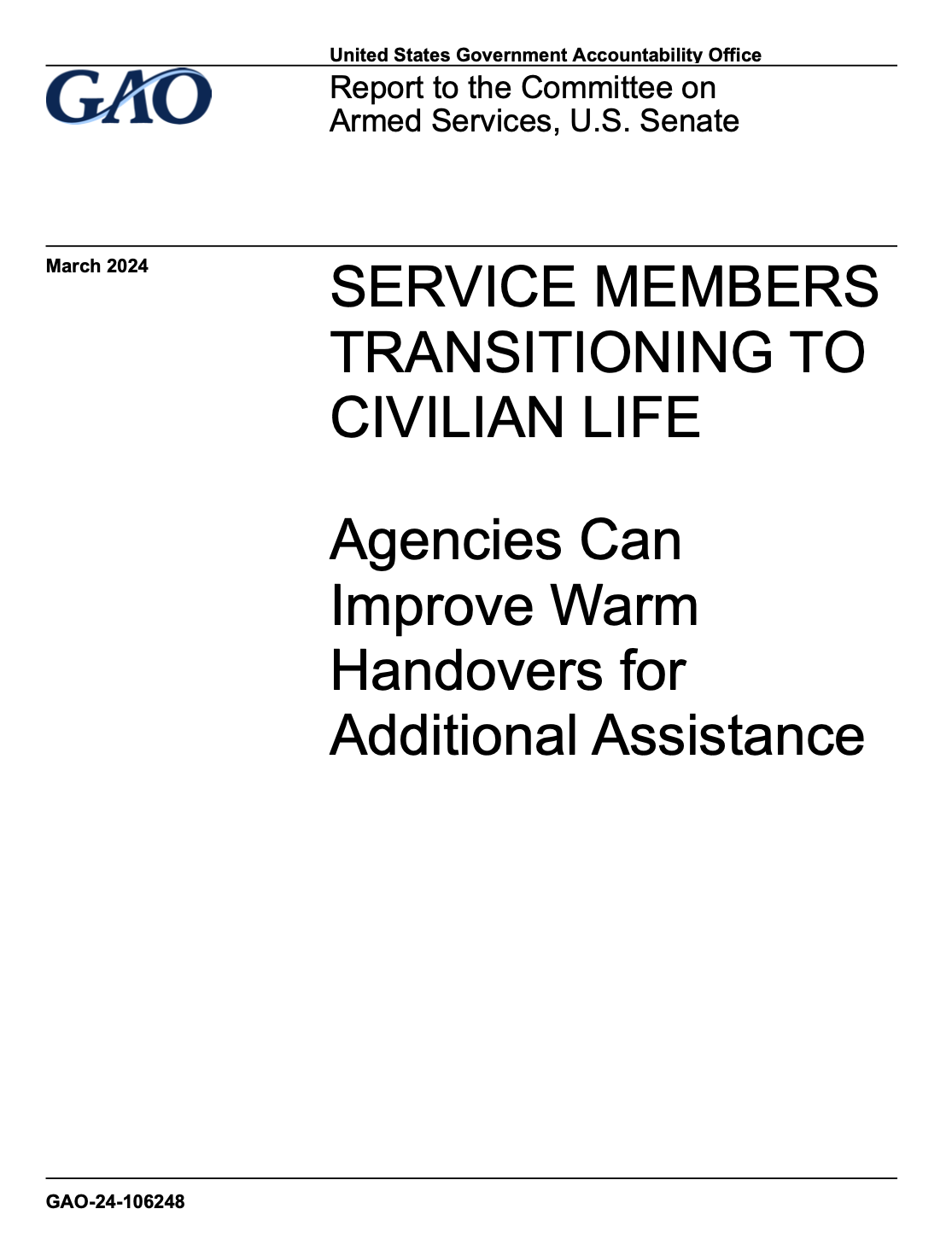
Disabled American Veterans (DAV): Women Veterans – The Journey to Mental Wellness
The DAV’s report, Women Veterans: The Journey to Mental Wellness, presents a targeted look at the growing mental health crisis among women veterans. The VA’s most recent National Veteran Suicide Prevention showed that between 2020 and 2021, the suicide rate among women veterans jumped 24.1%—nearly four times higher than the 6.3% increase among male veterans and vastly higher than the 2.6% increase among nonveteran women.
Women Veterans: The Journey to Mental Wellness takes a close look at the unique factors putting women veterans at risk for suicide, including high rates of military sexual trauma and intimate partner violence, substance use disorders and reproductive health challenges, put women veterans at higher risk for suicide.
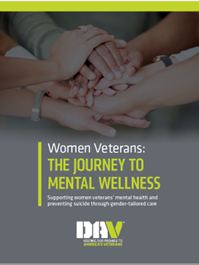
Bob Woodruff Foundation: Quantifying and Addressing Veterans Needs in 2023
The Got Your 6 Network: Quantifying and Addressing Veterans’ Needs in 2023 describes the military and veteran population’s needs in communities, as reported by our Got Your 6 Network partners nationwide. The report also highlights communities’ capability and capacity to address those needs.
In many communities, the military and veteran population’s needs exceed the available services. These needs include mental healthcare, physical healthcare, housing, emergency financial assistance, food, and transportation. While those needs have increased since 2021, service providers’ capacity is generally not keeping pace with those needs.
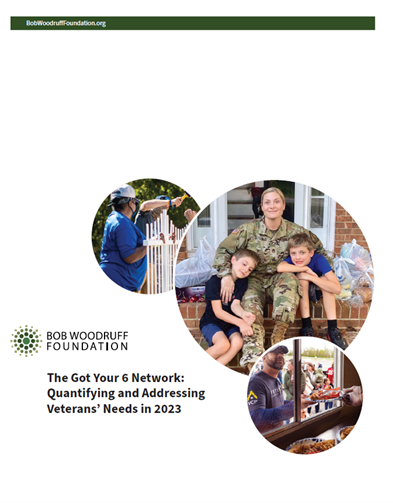
RAND: Meeting the Changing Needs of Veterans
Insights from Student Veterans Who Are Single Parents
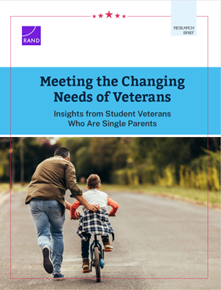
GAO: VA Health Care
Opportunities Exist to Further Meet Student Veterans’ Mental Health Needs
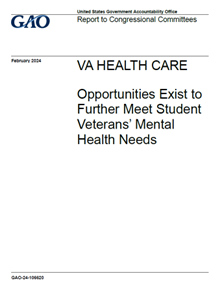
RAND: What Americans Think About Veterans and Military Service
Following release of the report, a January 18, webinar, What Americans Think About Veterans—and Why It Matters, featured survey data from the RAND American Life Panel and a discussion of the role of public perceptions in policies to support veterans and promote national security. WATCH THE WEBINAR RECORDING HERE.
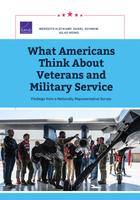
ICYMI – Watch a Recording of the Deep Dive and Analysis of Wisconsin Veteran Data
In case you missed it, the Wisconsin Department of Veterans Affairs and the Veterans Community Action Network (VetsCAN) would like to invite you watch a video recording of the Purdue University’s Military Family Research Institute (MFRI) “Deep Dive and Analysis of Wisconsin Veteran Data” which originally took place on November 30th, 2023.
2023 Veteran Opportunity Report
The 2023 Veteran Opportunity Report, powered by LinkedIn data and insights, highlights the challenges many American veterans face when entering the civilian workforce today — including low internship rates, undervalued military experience, and prevailing myths around retention.
This report is intended to help employers and policymakers better understand how to serve this underrepresented population and drive more effective hiring practices, policies, and programs for veterans. For veteran job seekers, the report also details the top industries, employers, and occupations hiring veterans in each state.

Veterans Policy Research Institute
The RAND Epstein Family Veterans Policy Research Institute, housed at the RAND Corporation, is dedicated to conducting innovative, interdisciplinary, evidence-based research to improve the lives of those who have served in the U.S. military.
Through a range of partnerships, the institute prioritizes creative, equitable, and inclusive analysis and evaluation to meet the needs of diverse veteran populations while engaging and empowering those who support them.
